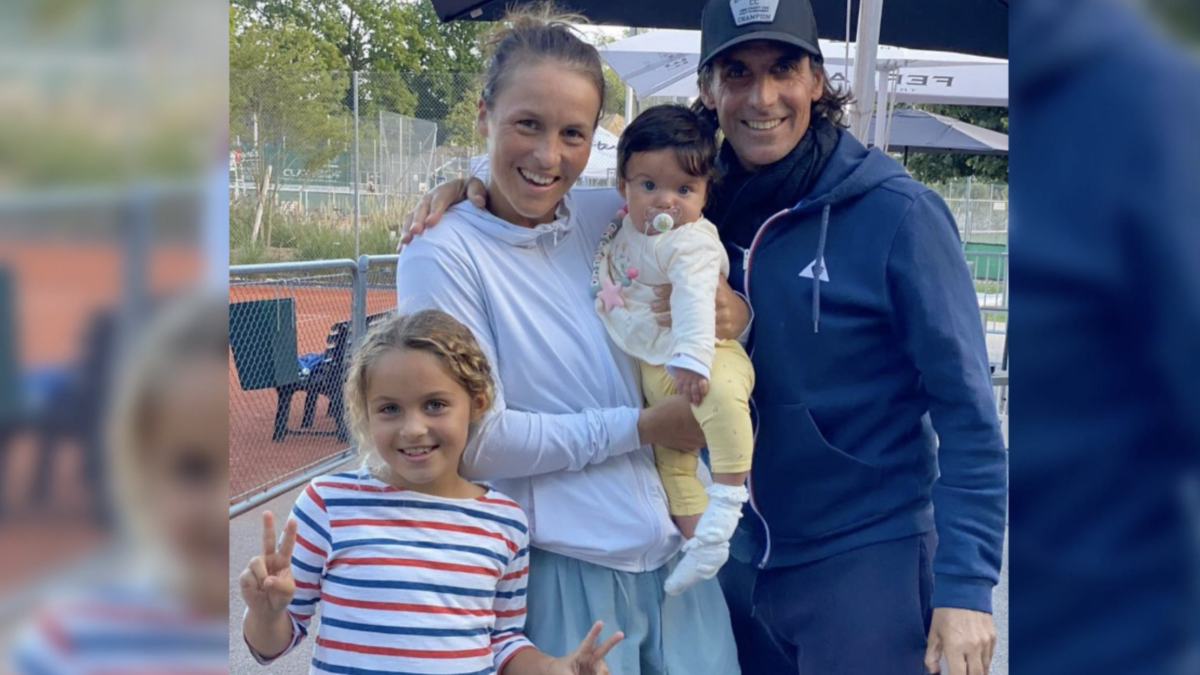Some like to argue that marriage, family, and professional success don’t mix. The opposite has been proven this week at Wimbledon, tennis’ most prestigious Grand Slam, by the performance of a German wife and mother of two. Thirty-four years of age and ranked outside the top 100, Tatjana Maria had never advanced beyond the third round in 34 previous Grand Slam attempts. 34! But this year, she made it all the way to the semifinals.
Maria’s game is a family affair. Her entourage on tour includes coach and husband Charles-Edouard Maria (a former player himself), and her daughters, eight-year-old Charlotte, and 15-month-old Cecilia.
Tennis is important, but Maria prioritizes family first. “That’s why it works so well that we are working together,” Maria said. “We are never fighting about tennis because we both know family is the most important. It will always stay like this.”
During her first maternity leave after Charlotte was born, Maria, on the advice of her husband/coach, changed from a double-handed to a single-handed backhand. The transition, risky and challenging for an established player, has made a significant difference in her game.
Maria’s style is unconventional, a departure from the hard-hitting “Big Babe Tennis” sometimes characterized as the “See-Ball-Hit-Ball” mentality. Think more Martina Hingis than Serena Williams. Her game is predicated on guile and superior movement, as well as slices and spins off both wings. Her feathery touch includes frequent drop shots, as well as great court sense, an innate anticipation of where her opponent’s ball is going to land.
In the fourth round, Maria saved two match points against the feisty, hard-hitting Jelena Ostapenko, winning the match 5-7, 7-5, 7-5.
The quarter-finals pitted her against a fellow German powerhouse 12 years her junior. While Jule Niemeier won the first set 6-4, Maria won the second and third sets with her unconventional style and superb movement around the court.
Tatjana Maria has been ranked as high as No. 46 in the world (2017). She is the oldest 1st-time semifinalist in the open era of tennis, and only the sixth woman to reach the semifinals of a Grand Slam after her 34th birthday. The distinguished list includes Venus and Serena Williams, Martina Navratilova, Chris Evert, and Billie Jean King.
When an interviewer in a post-match press conference asked if she was tired of questions about being a mother on tour, Maria replied, “It is the most important part of my life, being a mother. I love to talk about it.”
Players are starting to understand the value of having a strong support system behind the scenes, one which strengthens mind and body. Some, like Iga Świątek, the current woman’s No. 1, have hired sports psychologists or mental coaches, in addition to traditional coaches and physio trainers.
Tatjana Maria’s success demonstrates that a strong family system on tour can also provide stability. Daily Wimbledon pre-match preparation, for example, included familiar family routines, like arriving at the courts each morning with her eldest daughter. There Charlotte hit balls with other children, while Mom’s practice session occurred later in the day.
Though she lost in the semifinals Thursday to world No. 2 Ons Jabeur, Tatjana Maria’s Wimbledon run signifies a victory for the traditional ideals of marriage and family.
“It’s a dream,” she said in her on-court interview after winning her quarter-final match, “a dream to live this with my family, with my two little girls. I mean, one year ago, I had just given birth.”









